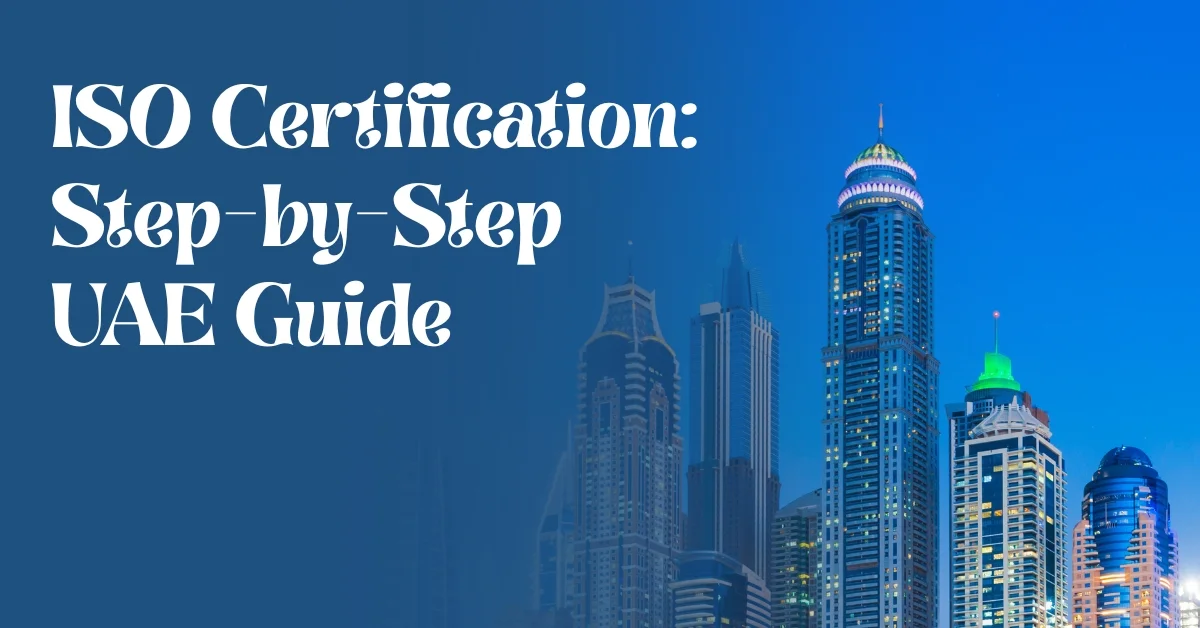What Is ISO Certification and Why It Matter in the UAE
ISO Certification serves as a formal recognition that a company complies with globally recognized standards for quality, safety, and efficiency. The certification is issued by an accredited body after a detailed audit of a company’s systems and processes.
In the UAE, ISO is especially important because the country aims to create a world-class business environment under Vision 2030. Government entities, multinational corporations, and even local SMEs often demand ISO compliance when choosing suppliers or partners.
Why businesses in the UAE pursue ISO certification:
- It improves product and service quality
- It builds trust with customers, partners, and investors
- It makes winning government tenders easier
- It ensures compliance with both UAE laws and international standards
For businesses competing in fast-growing markets like Dubai and Abu Dhabi, ISO is not just a quality label; it is a business growth strategy.
Popular ISO Standards for UAE Businesses
The ISO framework covers many areas, but not all are relevant to every company. Businesses in the UAE usually choose certifications that align with their industry and customer needs.
1. ISO 9001 – Quality Management System
ISO 9001 is the most popular standard worldwide. It helps companies improve processes, reduce errors, and keep customers satisfied. Whether you are in retail, construction, or IT, this certification fits all industries.
2. ISO 14001 – Environmental Management System
This standard helps businesses reduce waste, control pollution, and follow environmental rules. It is especially important in construction, oil and gas, and manufacturing, where environmental responsibility is highly scrutinized.
3. ISO 45001 – Occupational Health & Safety
Workplace safety is a big concern in industries like construction and logistics. ISO 45001 ensures that employees work in safer conditions, reducing accidents and improving staff morale.
4. ISO 22000 – Food Safety Management
Restaurants, catering firms, and food manufacturers use ISO 22000 to prove their products meet global food safety standards. This is particularly important in Dubai, which is a hub for hospitality and food exports.
5. ISO 27001 – Information Security Management
Data security is critical for banks, government agencies, and IT companies. ISO 27001 ensures that sensitive information is protected from cyber threats and misuse.
Who Should Get ISO Certified in the UAE?
ISO certification is not limited to one type of business; it can benefit companies across industries. However, some sectors and business types in the UAE gain more value from certification because of market expectations, regulations, and customer demands.
1. Government Suppliers
The UAE government has a strong focus on quality, safety, and efficiency. Many public sector tenders, especially in construction, oil and gas, IT, and facility management, require ISO certification as a pre-qualification.
Example: A construction company bidding for a Dubai Municipality project may need ISO 9001 (quality management) and ISO 45001 (health & safety) as part of the eligibility criteria.
Why it matters: Companies without ISO certification may miss opportunities to secure valuable government contracts.
2. Exporters and Global Traders
Companies that trade internationally often face strict compliance requirements from clients and regulators. ISO certification provides a globally recognized standard that builds trust across borders.
Example: A UAE-based food processing company exporting products to Europe will benefit from ISO 22000 (food safety) to meet EU import requirements.
Why it matters: ISO certification reduces barriers to international trade and improves competitiveness in global markets.
3. SMEs and Startups
Small and medium-sized enterprises often struggle to prove their credibility to new customers, investors, or partners. ISO certification levels the playing field by showing that even a smaller company follows international best practices.
Example: A tech startup in Abu Dhabi with ISO 27001 (information security) can win contracts from banks and government agencies that demand strict data security compliance.
Why it matters: Certification builds trust, attracts investors, and helps SMEs grow faster.
4. Large Corporations
Big companies, especially in regulated industries such as oil and gas, aviation, construction, healthcare, and manufacturing, often face strict compliance rules. ISO standards help them maintain consistency across multiple branches and projects.
Example: An oil and gas company in Abu Dhabi may adopt ISO 14001 (environmental management) to meet sustainability goals and international regulatory requirements.
Why it matters: ISO certification helps corporations reduce risks, improve efficiency, and maintain global credibility.
5. Service Providers
It’s not just manufacturing or industrial companies that benefit; service providers also gain value from ISO certification.
Example: A logistics company in Dubai with ISO 9001 can assure clients that shipments are managed with high-quality processes. Similarly, an IT company with ISO 20000 (IT service management) can prove its reliability to clients.
Why it matters: Service industries thrive on reputation. ISO gives them an edge over competitors.
6. Healthcare and Food Businesses
Healthcare providers and food businesses must follow strict health and safety regulations. ISO standards make compliance easier and increase customer confidence.
Example: A hospital in Sharjah with ISO 45001 (occupational health & safety) ensures staff and patient safety, while a restaurant chain with ISO 22000 (food safety) builds customer trust.
Why it matters: In sectors dealing with human health and safety, ISO certification isn’t just beneficial—it’s critical.
Step-by-Step Process to Get ISO Certification in UAE
Step 1 – Initial Consultation and Gap Analysis
The first step in the ISO certification journey is meeting with an ISO consultant who examines your existing business processes, systems, and documentation. Why it matters: Companies without ISO certification may miss opportunities to secure valuable government contracts. This stage highlights the strengths you already have and points out the gaps that need to be addressed. It sets the foundation for building a roadmap toward certification.
Step 2 – Documentation and Process Implementation
Once the gaps are identified, the next step is to prepare the required policies, procedures, and manuals that align with ISO standards. This is where the organization starts implementing new systems or improving existing ones. Employees are trained to follow these processes consistently in their daily tasks. Proper documentation ensures there is a clear record of compliance, and smooth implementation helps embed ISO requirements into the company’s culture.
Step 3 – Internal Audit and Corrective Actions
After implementation, the business carries out an internal audit, often called a trial audit. This is like a practice run to see if all processes match ISO requirements. The internal audit helps detect mistakes, weaknesses, or non-compliance issues that could cause problems during the external review. Corrective actions are then taken to fix these issues, ensuring the business is fully prepared for the official certification audit.
Step 4 – External Audit by Accredited Body
In this stage, an independent and accredited certification body conducts a formal audit of the company. The auditors carefully review the documentation, interview staff, and observe processes to confirm that the business meets every requirement of the chosen ISO standard. Their assessment is objective and impartial, and only if the company demonstrates full compliance will it move forward to certification.
Step 5 – Certification and Ongoing Compliance
Once the external audit is completed, the business is awarded its ISO certificate. However, earning certification is not a one-off milestone; it demands continuous effort and commitment. Companies must maintain compliance through regular monitoring and improvements, and they undergo annual surveillance audits by the certification body. These checks ensure that the organization continues to meet ISO standards and keeps its certification valid, while also driving long-term efficiency and quality improvements.
ISO Certification Cost and Timeline in UAE
Costs vary depending on business size, industry, and chosen ISO standard. Larger companies with complex operations pay more than smaller firms.
| Business Type | Estimated Cost (AED) | Timeframe |
| Small Business | 5,000–10,000 | 1–2 months |
| Medium Firm | 10,000–20,000 | 2–3 months |
| Large Company | 20,000+ | 3–6 months |
Factors that affect cost:
- Number of employees
- Number of departments or locations
- Type of ISO standard chosen
Tips to reduce costs:
- Work with experienced consultants to avoid delays
- Train employees early to avoid errors later
- Start with one standard and add others over time
Choosing the Right ISO Consultant in UAE
1. Why the Right Consultant Matters
An ISO consultant plays a key role in guiding your business through the certification journey. The right consultant not only simplifies the process but also ensures you meet every requirement correctly. This can save you time, money, and effort while helping your company achieve genuine international recognition.
Qualities of a good consultant:
- Deep knowledge of ISO standards
- Experience with UAE-based businesses
- Strong partnerships with accredited certification bodies
Questions to ask before hiring:
- Which ISO standards have you worked on before?
- Do you work with accredited certification bodies?
- Can you share success stories from previous clients?
Red flags to avoid:
- Promises of instant certification without audits
- Use of non-accredited certification bodies
Business Benefits of ISO Certification in UAE
ISO certification offers clear and measurable business advantages.
- Better reputation and credibility with customers and partners
- Increased trust among clients and stakeholders
- Easier access to government tenders and global contracts
- Improved internal processes and higher efficiency
- Reduced risks, workplace accidents, and operational mistakes
These benefits show why many UAE businesses treat ISO certification as an investment rather than an expense.
Common Mistakes to Avoid During ISO Certification
Some businesses fail or face delays in certification because of common errors:
- Rushing through the process without preparation
- Choosing non-accredited bodies that issue invalid certificates
- Poor documentation that fails to meet ISO requirements
- Not involving employees in the new systems
Avoiding these mistakes ensures smoother certification and long-term success.
FAQ
1. How long is an ISO certificate valid?
An ISO certificate is usually valid for three years, with yearly audits to maintain compliance.
2. How much does ISO certification cost in Dubai?
The cost ranges from AED 5,000 to over AED 20,000, depending on business size and complexity.
3. Can I get ISO certification without a consultant?
Yes, but working with a consultant makes the process faster and helps avoid mistakes.
4. Is ISO certification mandatory in the UAE?
It is not always required by law, but it is often necessary for government projects and international contracts.
Conclusion
ISO certification is more than just a certificate; it is proof that your business values quality, safety, and trust. For companies in the UAE, it improves credibility, builds customer confidence, and opens the door to new markets. Whether you are a startup or a large corporation, starting your ISO journey today is one of the best steps you can take for long-term success.






